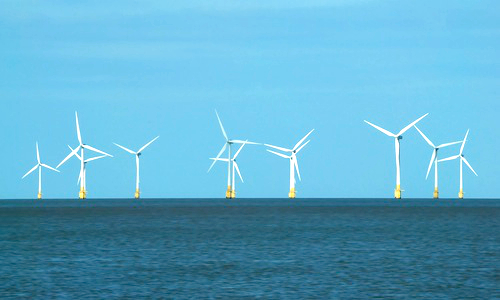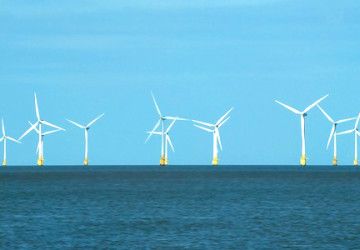

Photo courtesy of Shutterstock
Wind farm developer Dong Energy has said it’s “game on” for offshore wind in the UK, expecting it to be able to compete with conventional fossil fuels by the end of the decade.
The positive message from one of the country’s leading wind farm developers comes after the government announced an improved subsidy regime for large offshore wind projects.
In its National Infrastructure Plan, released last week, the government confirmed subsidies for onshore and solar power could be cut—following the increasing success and affordability of these technologies—in favor of offshore wind developments.
For the financial year 2018-19, the level of support will increase by ($8.20 USD) per MWh.
The announcement came just a week after RWE Npower shelved plans to build a 240-turbine wind farm in the Bristol Channel following warnings from the company over policy and investment uncertainty in the country.
Dong Energy’s Benj Sykes said last week’s announcement is a “concrete step in the right direction,” while the Danish firm’s British chairman Brent Cheshire said it is now “game on” for offshore wind development in the North Sea.
Cheshire said he expects offshore wind to be able to compete without subsides by as early as 2020.
Part of this dramatic swing from high cost to being highly competitive would derive from Dong finding ways to slash its operating costs by up to 40 percent through a range of innovations, including use of larger turbines and schemes that will allow standardization of products and processes, he said.
“By 2020 our target is that we will be competitive [with traditional fossil fuels] and the need for subsidies will disappear pretty quickly. We have to do this, otherwise people will not keep on paying these subsidies but we are confident that we will be able to produce a reduction in costs of between 35 percent and 40 percent by 2020.”
The message of hope comes at a critical time when some developers are questioning whether the subsidies are large enough to justify the huge expense of deep-water schemes.
Of the big six energy suppliers, RWE shelved a ($6.55 billion USD) plan to construct a wind farm off the Devon coast two weeks ago, and Centrica is struggling to find new investors for its ($3.28 billion USD) Race Bank scheme.
Cheshire, whose company is part-owner of the huge London Array wind farm off Kent, admits that some of his fellow energy executives have felt he is over-optimistic, but he is convinced of achievable progress.
Visit EcoWatch’s RENEWABLES page for more related news on this topic.

 233k
233k  41k
41k  Subscribe
Subscribe 

